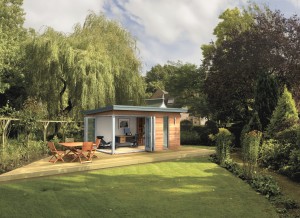Activism > Environment | Housing
 Summary. One way to enhance the home office, is to build a garden retreat that can serve as both a refreshing workplace and a place to stimulate creativity.
Summary. One way to enhance the home office, is to build a garden retreat that can serve as both a refreshing workplace and a place to stimulate creativity.
Below is a guest submission from Dawn Kubicek of Decorated Shed, a company that specializes in customized, compact, creative, dwellings for work, home, recreation, and retreat (like the one pictured here).
Dawn provides some familiar suggestions about how to live and work more environmentally friendly, and focuses on what the home office worker can do.
Working from home, either permanently or just one or two days per week is an inherently green decision. The emissions reduction from travelling is the most immediate benefit, and is one of many that become apparent over time.
Decorated Shed garden offices are built to be energy efficient and deliver phenomenal insulation performance, meaning that you need minimal heating and cooling all year round.
However, being a green homeworker doesn’t end at simply working from home. There are several simple practices that can be incorporated into your working day that help to minimise your impact on the planet even further. The good news is that they’re all simple and easy to implement into your routine, and will bring tangible benefits to both your work and your pocket.
Here are some green office tips for homeworkers;
- Buy eco-friendly office products. Recycled paper is the commonly-known product here, but almost every other office item has a recycled version available. Pens, pencils, mousepads, calendars, almost every item of stationery imaginable… all available in eco-friendly variants.
- Recycle! Be a part of the process by recycling your recycled office products when you’re finished with them, and give them yet another chance to be used in a new life! It’s a sad fact that while 80% of the office products used in the UK are recyclable, a pitiful 8% ends up being recycled*.
- Buy FSC-certified or second-hand desks. If you’re buying new office desks try to make sure they’re from FSC-certified sources, which means they’ve come from responsible and sustainably managed forests. Alternatively, see what’s available locally second-hand. As many companies regularly re-fit their office spaces there are often some impeccable quality office furniture items available second-hand, and this removes the need to buy a newly produced item.
- Buy an energy-efficient computer and other electronics. Laptops usually use less energy than computer and monitor combinations, and the eco-friendly options for these are improving on an almost daily basis. The situation is similar for printers and fax machines, with many energy efficient options widely available.
- Go easy on the print outs. “Don’t print this out unless necessary” is a well-worn office mantra, but for good reason. Printing things out to read them is really unnecessary, especially considering they’re on the screen right in front of you, and the process wastes paper, ink, energy, time and ultimately money – quite a lot of valuable resources.
- Switch off. If you’re not in the office, it doesn’t need to be on. With the possible exception of the fax machine, every single energy-using item in your office should be switched off and shut down at the end of the day. Computer, printer, scanner, copier, lights – all off.
